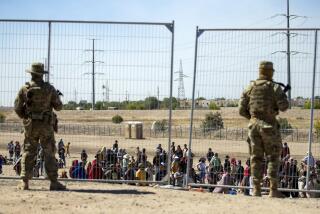Senate Favors Federal Airport Screeners
- Share via
WASHINGTON — The Senate appears likely to approve an air security bill that calls for a federal takeover of passenger and baggage screening at the nation’s busiest airports, a vote that will test the spirit of unity that has prevailed in the capital since the terrorist attacks.
The Bush administration is resisting using federal employees to do the screening and has proposed a compromise that would significantly increase government control and supervision but still allow private security company employees to do the job.
Nonetheless, Senate Democratic leaders and a number of Republicans pressed Wednesday for a vote on the bill that would make more than 15,000 screeners federal employees, as well as require secure cockpits, more air marshals, anti-hijack training for flight crews and other security measures.
Approval could come today.
“The Senate is solid on this, that’s the thing,” said an aide to a senior GOP senator. “Senators are for federalization, particularly at the busiest airports.”
An aide to Sen. Ernest F. Hollings (D-S.C.), chairman of the Senate Commerce Committee, said his boss is confident that he has the votes to pass the bill. Hollings told colleagues Wednesday it would be “embarrassing” if the Senate delayed a vote on air security after approving a $15-billion airline industry bailout.
Separately, in a sign that the new emphasis on aviation security extends across national borders, the Mexican government agreed Wednesday to allow federal air marshals on U.S. airline flights between the two countries. Discussions are underway on whether federal marshals might also fly on Mexican airlines serving the United States.
In Washington, Transportation Secretary Norman Y. Mineta was on Capitol Hill on Wednesday trying to work out a compromise on the screener issue.
Congressional aides circulated an administration proposal that would take control of the screeners away from the airlines, which are now responsible for checking passengers. But the plan stops short of requiring screeners to be government employees. An aide to Hollings said the administration’s proposal was unacceptable.
“You cannot contract out national security and public safety,” Hollings aide Andy Davis said.
According to a draft of the administration’s proposal, the Transportation Department would assume direct responsibility for security screening. But it would still have the option of hiring private security firms to do the job.
The department would have 18 months to determine, airport by airport, whether private firms would provide at least the same level of security as federal workers.
Because the administration is concerned about the cost of hiring thousands of federal security screeners, critics of the administration plan say there would be a built-in incentive to hire private contractors.
The administration proposal would create a new Transportation Security Administration, which would have overall responsibility for protecting airports. The agency would train and supervise the screeners, who would all be required to wear a government uniform. A federal law enforcement officer would also be present at every airport checkpoint. Job qualifications for screeners would be determined by the agency, which would also conduct background checks.
“We’ll be giving a work force that taxpayers paid to train to private companies,” said a congressional staff member. “If we’re going to train them, why don’t they become federal employees?”
Pressure was building on the administration to support a federal takeover of the screening, at least at 142 large and medium-sized hub airports. Key Republicans, including Sens. John McCain (R-Ariz.) and Kay Bailey Hutchison (R-Texas), have joined Democrats in support of the move, contending it is critical to restoring public confidence in air travel. The added security would be financed by a $3 to $5 surcharge on tickets.
Republican leaders objected to Democratic efforts to add to the security bill $3.8 billion in aid for laid-off airline and airport workers, $3 billion for Amtrak security and operations and other amendments.
McCain, the top Republican on the Senate Commerce Committee, urged his colleagues to set aside unrelated issues and pass the security bill immediately. He said he hoped it could be passed today.
But the bill could face trouble in the Republican-dominated House, where GOP members of the Transportation Committee were nearly unanimous in their support of the administration, said an aide to a top Republican.
The air security bill is the first of a series of measures moving through Congress to tighten security at railroads, seaports, dams, power plants and other critical facilities and transform the way Americans travel in the wake of the terrorist attack.
Under the proposed Senate bill, screeners at the 142 busiest airports would be hired and trained by the federal Department of Transportation at an estimated cost of $1.8 billion. An armed law enforcement officer would be posted at every screening checkpoint. At small airfields, screening could be contracted out to state or local law enforcement officials.
*
Times staff writers James F. Smith in Mexico City and Janet Hook in Washington contributed to this report.
More to Read
Get the L.A. Times Politics newsletter
Deeply reported insights into legislation, politics and policy from Sacramento, Washington and beyond. In your inbox twice per week.
You may occasionally receive promotional content from the Los Angeles Times.











